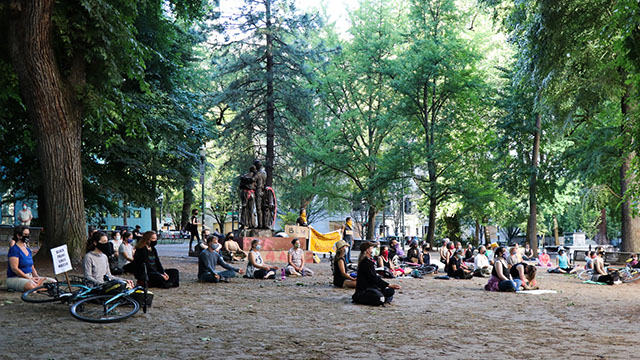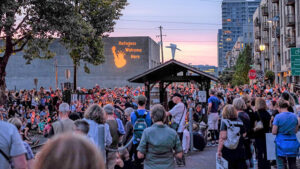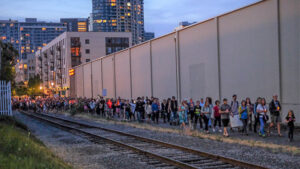Walking Mindfully, Compassionately, and Bravely
Written by: K. Kendall

People gathered at Portland’s Chapman Square Park on July 14 for the first meditation for Black lives.
Photos by: K. Kendall and James Sissler
Members of Portland Buddhist Peace Fellowship witnessed against racism this fall, by practicing walking and sitting meditation at the epicenter of 130 days of protests following the May 25 murder of George Floyd.
The Portland Buddhist Peace Fellowship (PBPF) summer actions on behalf of Black lives were more consistent and vigorous than anything the chapter had previously done, despite vigorous witnessing of injustice for the last three years.

On July 12, 2019, Portland Buddhist Peace Fellowship held a mass vigil and walking meditation at the Immigration and Customs Enforcement (ICE) building in Portland.
In 2017 Portland Buddhist Peace Fellowship held public meditations in conjunction with anti-fascist actions. From 2018 to 2020 they held a monthly “Thawing ICE” walking meditation, circling the local Immigration and Customs Enforcement building. Then in July 2019 they gathered more than a thousand people for a massive meditative walk for immigrants, in the “Lights for Liberty” action.
The Portland Buddhist group, like groups in other parts of the country, has evolved from the Buddhist Peace Fellowship originated in 1978 by Roshi Robert Baker Aitken in Maui. After the broader protests started in Portland following George Floyd’s death, Portland Buddhist Peace Fellowship began offering weekly walking meditations for Black Lives at Portland’s Chapman Square Park, across the street from the heart of the protests.
Each night culminated in police violence that included chemical weapons, impact munitions, targeted arrests, and the “bull rush” (a formation of armed riot police running toward protesters and beating them back with metal truncheons and pepper spray). By November the protests and retaliations continued sporadically.

After the vigil more than 1,000 people participated in a meditative walk, encircling the ICE building.
PBPF members practiced walking meditation one or two hours before the protests began for 16 consecutive Tuesdays, from July 14 through the beginning of November. The one exception was July 21, when Chapman Square Park was blocked off by the police. On that occasion the walking meditation encircled Portland City Hall.
Oregon’s second lockdown for Covid-19 interrupted the meditations in November, but the intention is to resume and to continue bi-weekly through the winter, as a public statement that Black lives always matter.
The meditations have been livestreamed through Facebook, and thus offered online for those at high risk for Covid-19. They have been in-person (masked, with physical distancing) for those who felt safe gathering outdoors.
Each walking meditation began by acknowledging Native Americans’ previous ownership of the land, and with a statement of intention. Each ended with bows of gratitude to each other and to all beings. They often closed with a reminder that meditation nourishes us, so we can continue the lifelong work of creating systemic change.

On July 21 more than 300 meditators completely encircled city hall with walking meditators two and three deep.
Meditators near Chapman Square Park often encountered startling pops, bangs and whistles from fire crackers and incendiary devices use by protestors, as well as the sounds of car horns, buses and sirens. Meditators learned to practice, as Thich Nhat Hanh recommends, by saying “yes, yes, yes” to the moment, breathing in and breathing out with their steps. They strove to be aware and compassionate toward other beings, present for the truth of the moment.
A July 28 post on the PBPF YouTube channel shows how much environmental damage was done to the park during the protests. Traces of CS gas (called tear gas, but actually a powder) were visible across the park. All the grass and most of the bushes in Chapman Square were dead. The Gingko trees were mottled with chemical agents.
Meditators sat on dust and walked on concrete. Environmental agencies said they were investigating the effects of runoff from chemical weapons, but reports were delayed.
In August PBPF issued a statement on Facebook that their walking meditations are “silent, but not peaceful.” This was a response to a police narrative that “good protesters” are “peaceful,” meaning compliant with police, while “bad protesters” engage in “riots,” meaning they resist police orders.

On July 21 about 300 Portland Buddhist Peace Fellowship protestors meditated for Black lives at Portland City Hall.
The PBPF statement explained, “To be peaceful in this moment of state violence is to be complicit. We are not complicit.” It quoted Rev. Zenju Earthlyn Manuel’s book “The Deepest Peace.” He wrote, “Peace is not superior. Peace is persistent. Rage is persistent as well. I meditate while trembling with rage.”
The PBPF statement, which garnered 330 shares on Facebook, said, “We meditate in rage, honoring the suffering caused by white supremacy. We meditate in silence. Silence is a tactic. We are strengthened by meditation to find other ways to resist the domination of a violent state.”
I was in Covid-19 quarantine in July, but by August I joined the meditators, and in a statement I affirmed principles of my vipassana practice, turning toward the truth and the shadow.

On Aug. 11 about 100 meditators circled Chapman Square during the Portland Buddhist Peace Fellowship Meditation for Black Lives.
“The actions of the past two months have harmed many forms of life, seen and unseen: human, animal and plant,” I wrote. “As we bear witness to this harm, we also bear witness to the harm caused by racist policies throughout American history: enslavement, lynching, mass incarceration, and state-sponsored murder of Black bodies.”
Sarah DeYoreo, who describes her meditation practice as “eclectic,” explained why she joined the PBPF meditation:
“The systems we are here to protest—white supremacy, anti-Blackness, policing and incarceration, capitalism, patriarchy, heterosexism, ecological destruction and exploitation—are built to deny our interconnection,” she said. “Some of us, more than others, appear to benefit from some of these systems, but in reality we all lose: we lose one another, we lose ourselves, we lose the gift and miracle of what it is to be alive, amongst other life.”

During the Aug. 11 meditation some stood and some sat, while others circumambulated Chapman Square.
DeYoreo urged the meditators to contemplate, as they walked, the difficult task of creating systemic change.
“There are ways we could learn to embrace and celebrate difference, rather than seeking to annihilate it,” she said. “They would require, for one thing, all members of the Portland Police Bureau to abandon their posts and lay down their armor and weapons. They would require people everywhere to reject things they’ve been taught to believe keep them safe and comfortable, and to courageously lean into certain kinds of discomfort, vulnerability, and uncertainty or unknowing, with only faith in one another for support.”
Deborah Einbender, who trained in Zen with Robert Baker Aitken, and is now following Theravada tradition, closed a meditation with these words:
“I am here to grapple with the legacy of harm that I as a white person have both caused and benefited from; to let my heart break open and ask, ‘What can I do?’” she said. “I have come to believe that our doing together here tonight is basically a being together, a showing up, a putting our bodies where our mouth is, opening to the field of basic goodness that is created when we come together.… We are doing the holy work of increasing our capacity to tolerate discomfort—to stay and grapple. Buddhist practice is the best tool I have for navigating this place of discomfort and unknowing.”
Kendall is an organizer of the Portland Buddhist Peace Fellowship. She has been a Buddhist practitioner since 1959 and practices vipassana. Her root teacher was Godwin Samararatne. A retired professor of theater studies, she earned a doctorate degree from the University of Texas, was a Fulbright Senior Scholar, and for six years in southern Africa led Boal-inspired theater for liberation.
